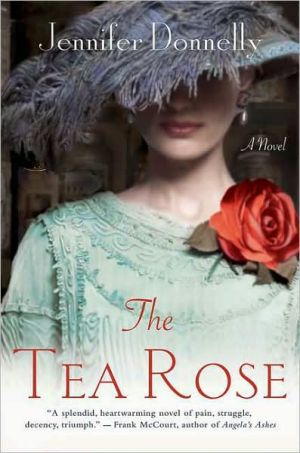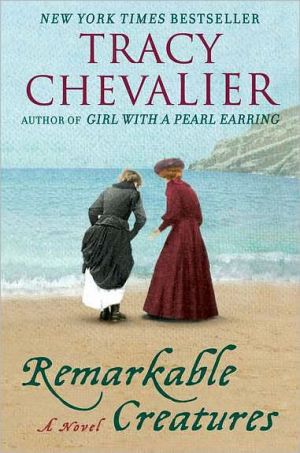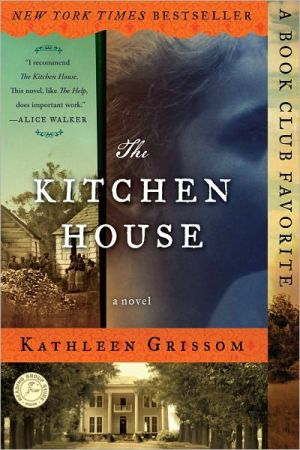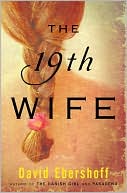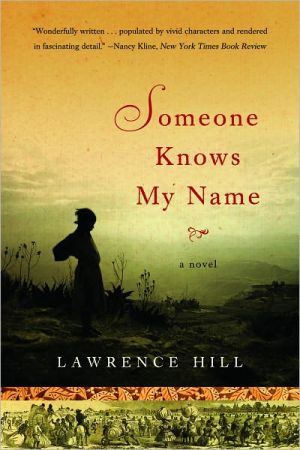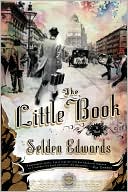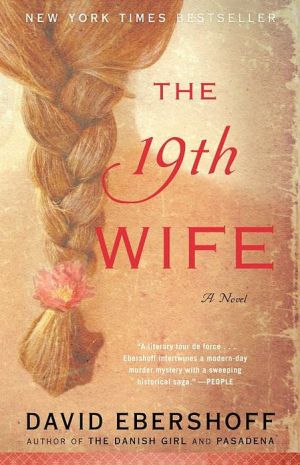The Tea Rose
East London, 1888 - a city apart. A place of shadow and light where thieves, whores, and dreamers mingle, where children play in the cobbled streets by day and a killer stalks at night, where bright hopes meet the darkest truths. Here, by the whispering waters of the Thames, Fiona Finnegan, a worker in a tea factory, hopes to own a shop one day, together with her lifelong love, Joe Bristow, a costermonger's son. With nothing but their faith in each other to spur them on, Fiona and Joe...
Search in google:
Following in the footsteps of such beloved epics as A Woman of Substance, The Thornbirds, and The Shell Seekers comes this towering story of murder and revenge, of love lost and won again, and of one determined woman's quest to survive and triumph...The Tea RoseEast London, 1888-a city apart. A place of shadow and light where thieves, whores, and dreamers mingle, where children play in the cobbled streets by day and a killer stalks at night, where bright hopes meet the darkest truths. Here, by the whispering waters of the Thames, Fiona Finnegan, a worker in a tea factory, hopes to own a shop one day, together with her lifelong love, Joe Bristow, a costermonger's son. With nothing but their faith in each other to spur them on, Fiona and Joe struggle, save, and sacrifice to achieve their dreams.But Fiona's life is shattered when the actions of a dark and brutal man take from her nearly everything-and everyone-she holds dear. Fearing her own death, she is forced to flee London for New York. There, her indomitable spirit propels her rise from a modest West Side shop-front to the top of Manhattan's tea trade. But Fiona's old ghosts do not rest quietly, and to silence them, she must venture back to the London of her childhood, where a deadly confrontation with her past becomes the key to her future.."Full of warmth and rich period detail, The Tea Rose begs for a comfy, overstuffed chair and plenty of time to keep turning those pages." -Dallas Morning News"Steeped in melodrama, revenge, and a maddeningly star-crossed romance...a fine yarn." -PeoplePublishers WeeklyDonnelly indulges in delightfully straightforward storytelling in this comfortably overstuffed novel. In 1880s London, the squalid Thames-side neighborhood of Whitechapel is home to Fiona Finnegan, spunky daughter of Paddy Finnegan. Both are employed by unscrupulous tea merchant William Burton, but Fiona is saving to start a shop with her love, Joe Bristow. Just as her future seems assured, a string of tragedies toppledher hopes. Joe is tricked into marriage to another woman, Burton has Paddy killed for supporting a labor union, Fionas mother is murdered by Jack the Ripper and Fionas distraught brother is found dead in the Thames. Fiona had been attempting to get compensation from Burton for her fathers death, but when she overhears his boasts of killing Paddy, she must flee for her life with her sole remaining brother, five-year-old Seamie. She rushes to a seaport, but cannot get passage until the wealthy dandy Nicholas Soames offers it, pretending she is his wife. The scene switches to New York City of the Gay 90s, to the glitter of Delmonicos, the elegance of Gramercy Park and the crowded tenements of downtown. Fiona lodges with her alcoholic Uncle Michael and saves both him and his grocery on her way to making her fortune in the tea industry. But she never forgets her familys fate, and when she can, she returns to England to revenge herself on Burton. Though Donnellys indomitable heroine steps out of period character from time to time"her easy acceptance of Soamess homosexuality is particularly unlikely"the novels lively plotting, big cast of warmly drawn characters and long-deferred romantic denouement make this a ripping yarn. In the final dramatic settling of scores, Donnelly even ventures to unmask Jack the Ripper. (Oct. 1) Forecast: This epic historical novel has more muscle than most and comes equipped with blurbs from Frank McCourt and Simon Winchester. Rights have been sold in France, Germany and Italy, and Donnelly will embark on an author tour. Copyright 2002 Cahners Business Information.
Prologue\ Polly Nichols, a Whitechapel whore, was profoundly grateful to gin.\ Gin helped her. It cured her. It took away her hunger and chased the chill from her joints. It stilled the aching in her rotten teeth and numbed the slicing pains she got every time she took a piss. It made her feel better than any man ever had. It calmed her. It soothed her.\ Swaying drunkenly in the darkness of an alley, she raised a bottle to her lips and drained it. The alcohol burned like fire. She coughed, lost her grip on the bottle, and swore as it smashed.\ In the distance, the clock at Christ Church struck two, its resonant chime muffled in the thickening fog. Polly dipped her hand into her coat pocket and felt for the coins there. Two hours ago, she’d been sitting in the kitchen of a doss-house on Thrawl Street, penniless. The landlord’s man had spotted her there, asked for his fourpence, and turned her out when she couldn’t supply it. She’d cursed and screamed at him, telling him to save her bed, he’d get his doss money, telling him she’d earned it and drunk it three times over that day.\ “And I got it, too, you bastard,” she muttered. “Didn’t I say I would? Got yer poxy fourpence and a skinful to boot.”\ She’d found her money and her gin in the trousers of a lone drunk wending his way down the Whitechapel Road. He’d needed a bit of coaxing. At forty-two, her face was no longer her fortune. She was missing two front teeth and her pug nose was thick and flattened across the bridge like a fighter’s, but her large bosom was still firm and a glimpse of it had decided him. She’d insisted on a swig of his gin first, knowing a mouthful would numb her throat, get up her nose, and block the beer and onions stink of him. As she drank, she’d unbuttoned her camisole, and while he was busy groping her, she’d slipped the bottle into her own pocket. He was clumsy and slow and she was glad when he finally pulled away and staggered off.\ Christ, but there’s nothing like gin, she thought now, smiling at the memory of her good fortune. To feel the weight of a bottle in your hands, press your lips against the glass, and feel the blue ruin flowing down your throat, hot and harsh. Nothing like it at all. And close to full that bottle had been. No mean thru’penny swig. Her smile faded as she found herself craving more. She’d been drinking all day and knew the misery that awaited her when the booze wore off. The retching, the shaking, and, worst of all, the things she saw—black, scuttling things that gibbered and leered from the cracks in the walls of the doss-house.\ Polly licked her right palm and smoothed her hair. Her hands went to her camisole; her fingers fumbled a knot into the dirty strings threaded through the top of it. She tugged her blouse together and buttoned it, then lurched out of the alley and down Bucks Row, singing to herself in a gravelly, gin-cracked voice:\ “Oh, bad luck can’t be prevented,\ Fortune, she smiles or she frowns,\ ’E’s best off that’s contented,\ To mix, sir, the ups and the downs . . .”\ At the corner of Bucks Row and Brady Street, she suddenly stopped. Her vision blurred. A buzzing noise, low and close like the wings of an insect, began in her head.\ “I’ve the ’orrors of drink upon me,” she moaned. She held her hands up. They were trembling. She buttoned her coat up around her neck and began to walk faster, desperate for more gin. Her head lowered, she did not see the man standing a few feet ahead of her until she was nearly upon him. “Blimey!” she cried. “Where the ’ell did you come from?”\ The man looked at her. “Will you?” he asked.\ “No, guv’nor, I will not. I’m poorly just now. Good night.”\ She started to move off, but he grabbed her arm. She turned on him, her free arm raised to strike him, when her eyes fell upon the shilling pinched between his thumb and forefinger.\ “Well, that changes things, don’t it?” she said. His shilling plus the fourpence she already had would buy booze and a bed tonight, tomorrow, and the day after, too. As sick as she felt, she couldn’t turn it down.\ Polly and her client walked back the way she’d come in silence, past tumble-down dwellings and tall brick warehouses. The man had a powerful stride and she found herself trotting to keep pace. Glancing at him, she saw he was expensively dressed. Probably had a nice watch on him. She’d certainly have a go at his pockets when the time was right. He stopped abruptly at the end of Bucks Row, by the entrance to a stable yard.\ “Not ’ere,” she protested, wrinkling her nose. “By the metal works . . . a little ways down . . .”\ “This’ll do,” he said, pushing her against two sheets of corrugated metal, secured by a chain and padlock, that served as the stable’s gate.\ His face shone weirdly bright in the thickening darkness, its pallor broken by eyes that were cold and black. A wave of nausea gripped her as she looked into them. Oh, Jesus, she pleaded silently, don’t let me be sick. Not here. Not now. Not this close to a whole shilling. She forced herself to breathe deeply, willing the nausea to subside. As she did, she inhaled his scent—Macassar oil, sweat, and something else . . . what was it? Tea. Bloody tea, of all things.\ “Let’s get on with it then,” she said. She lifted her skirts, fixing him with a look of weary expectation.\ The man’s eyes were glittering darkly now, like shiny pools of black oil. “You filthy bitch,” he said.\ “No dirty talk tonight, pet. I’m in a bit of an ’urry. Need some ’elp, do you?” She reached for him. He slapped her hand away.\ “Did you really think you could hide from me?”\ “Look ’ere, are you going to—” Polly began. She never finished. Without warning, the man grabbed her by the throat and slammed her into the gate.\ “Leave off!” she cried, flailing at him. “Let me go!”\ He tightened his grip. “You left us,” he said, his eyes bright with hatred. “Left us for the rats.”\ “Please!” she rasped. “Please don’t ’urt me. I don’t know about any rats, I swear it . . . I . . .”\ “Liar.”\ Polly never saw the knife coming. She had no time to scream as it plunged into her belly, biting and twisting. A soft gasp escaped her as he pulled it out. She stared at the blade, uncomprehending, her eyes wide, her mouth a great, round O. Slowly, delicately, she touched her fingers to the wound. They came away crimson.\ She lifted her eyes to his, her voice rising in a wild, terrified keen, and looked into the face of madness. He raised his knife; it bit into her throat. Her knees buckled and all around her darkness descended, enveloping her, dragging her into a thick and strangling fog, a fog deeper than the river Thames and blacker than the London night that swirled down on her soul.\ Copyright © 2002 by Jennifer Donnelly. All rights reserved.
\ Publishers WeeklyDonnelly indulges in delightfully straightforward storytelling in this comfortably overstuffed novel. In 1880s London, the squalid Thames-side neighborhood of Whitechapel is home to Fiona Finnegan, spunky daughter of Paddy Finnegan. Both are employed by unscrupulous tea merchant William Burton, but Fiona is saving to start a shop with her love, Joe Bristow. Just as her future seems assured, a string of tragedies toppledher hopes. Joe is tricked into marriage to another woman, Burton has Paddy killed for supporting a labor union, Fionas mother is murdered by Jack the Ripper and Fionas distraught brother is found dead in the Thames. Fiona had been attempting to get compensation from Burton for her fathers death, but when she overhears his boasts of killing Paddy, she must flee for her life with her sole remaining brother, five-year-old Seamie. She rushes to a seaport, but cannot get passage until the wealthy dandy Nicholas Soames offers it, pretending she is his wife. The scene switches to New York City of the Gay 90s, to the glitter of Delmonicos, the elegance of Gramercy Park and the crowded tenements of downtown. Fiona lodges with her alcoholic Uncle Michael and saves both him and his grocery on her way to making her fortune in the tea industry. But she never forgets her familys fate, and when she can, she returns to England to revenge herself on Burton. Though Donnellys indomitable heroine steps out of period character from time to time"her easy acceptance of Soamess homosexuality is particularly unlikely"the novels lively plotting, big cast of warmly drawn characters and long-deferred romantic denouement make this a ripping yarn. In the final dramatic settling of scores, Donnelly even ventures to unmask Jack the Ripper. (Oct. 1) Forecast: This epic historical novel has more muscle than most and comes equipped with blurbs from Frank McCourt and Simon Winchester. Rights have been sold in France, Germany and Italy, and Donnelly will embark on an author tour. Copyright 2002 Cahners Business Information.\ \ \ \ \ Library JournalIn 1888, Fiona Finnegan and Joe Bristow hoard shillings and pennies so that they can marry and open a shop. But Jack the Ripper stalks the streets of London's East End, and poverty threatens from the shadows. Setting the story in motion is the murder of Fiona's father, a dock worker whose union activities angered his tea-company boss. Fiona and her younger brother must flee to New York City to avoid their own murders. Through hard work and luck, Fiona and her beloved Joe prosper on opposite sides of the Atlantic. Misunderstandings and mistakes keep them apart as they build separate lives and incredible fortunes. Children's book writer Donnelly effortlessly takes her narrative through slums and high society while intertwining a number of subplots without tangling them. Both major and minor characters capture and hold interest and sympathy. Although the number of Fiona and Joe's near encounters stretches the imagination, readers will forgive the tease once the lovers' reunion and Fiona's revenge for her father's death converge in an action-packed ending. Public library readers will relish this rags-to-riches romance. Kathy Piehl, Minnesota State Univ., Mankato Copyright 2002 Cahners Business Information.\ \ \ Kirkus ReviewsA bright, plucky, and (of course) beautiful Cockney girl escapes poverty and violence in the Whitechapel neighborhood of Victorian-era London to make her fortune in New York City. In Donnelly's sprawling debut, the heroine is heroic, the villains villainous (and rich), and the heroine's love interests in need of a strong woman like her to keep them out of trouble. Seventeen-year-old Fiona Finnegan's plans to open a shop with her childhood sweetheart Joe are dashed when Joe succumbs to the wiles of his boss's daughter and ends up in a shotgun wedding. Fiona's distress is compounded by her father's accidental death at the Burton Tea Company, where he was organizing a union, her mother's murder by Jack the Ripper, and her brother's drowning. When Fiona overhears William Burton, the cold-eyed, knife-wielding owner of Burton Tea, brag that he had her father murdered, she realizes her own life is in danger and flees to America. Befriended en route by a young art collector named Nick, Fiona is put off by neither his syphilis nor his homosexuality, an open-mindedness that rings false in the Victorian setting. Taking over her alcoholic uncle's failing business, Fiona becomes a successful grocer, and, although she still pines for Joe, she enjoys being wooed by a charming, prominent financier. Then Nick faces a homophobic scandal instigated by her wealthy suitor's son. Unaware that Joe, whose marriage ended when his wife miscarried, is still searching for her, Fiona marries Nick to save his reputation and settles into what turns into a happy if unconventional marriage. While amassing a fortune in the tea and grocery trade, Fiona secretly plans to wreak revenge on Burton. After Nick's death andextensive plotting, she returns to London, reunites with Joe, and causes Burton financial ruin, which brings out his murderous side. Or perhaps he was more murderous all along than in anyone's worst suspicions. Bland, despite the gruesome-deaths quotient. Author tour\ \
